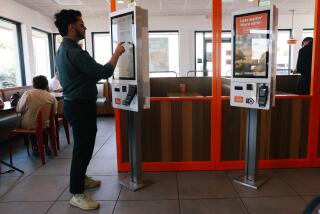Investing: Weak economy takes bite out of Sonic shares
- Share via
Question: What has happened to my shares of Sonic Corp.? I expected better results.
Answer: A weak economy and its resulting pressure on sales have taken the sizzle out of the stock of the nation’s largest drive-in restaurant chain. The investor must decide whether its discounted stock price makes it a tasty investment or foreshadows difficulties ahead.
The company is committed to its signature elements: carhop service, humorous TV commercials, frequent new menu items and aggressive special promotions.
Shares of Sonic have fallen 29% this year. Net income for the fiscal year that ended Aug. 31 slipped to $19.2 million from $21.2 million the prior year.
The quick-service food industry offers growth potential, but commodities, marketing efforts and minimum wages carry cost uncertainty. The weather is another consideration for drive-in restaurants.
McDonald’s, Burger King and Wendy’s are the giants of a quick-service burger industry battling over pricing and meal combinations. They realize the consumer can easily switch among them.
Sonic greeted 40 new franchised drive-ins in the fiscal year that ended Aug. 31 and expects 30 to 40 more this fiscal year. While generally a positive, expansion outside its core markets increases competition it will encounter.
The consensus rating on shares of Sonic among Wall Street analysts who track them is between a “buy” and “hold,” according to Thomson Reuters, consisting of two “strong buys,” four “buys,” nine “holds” and three “underperforms.”
Begun in 1953 in Shawnee, Okla., as Top Hat Drive-In, the company adopted the Sonic name in 1959. J. Clifford Hudson, CEO since 1995, added the chairman position in 2000.
Sonic has grown to more than 3,500 restaurants in 42 states. Sales at stores open at least a year increased one-half of 1% in the last fiscal year.
Poor results at DWS International Fund
Question: Is DWS International Fund still worth holding?
Answer: The fund has had a rocky go of it.
The $730-million DWS International Fund S was down 12% during a recent 12-month period, ranking in the bottom 13% of the large foreign growth and value category. Its three-year annualized return of 9% placed it just outside the lowest 10% of its peers.
The previous investment team departed last spring after three unsuccessful years. New managers Thomas Voecking and Jason Inzer now track buy and sell recommendations of more than 5,000 global analysts and rate them based on the accuracy of their past calls.
Selections by the most successful analysts populate this fund’s portfolio, with changes made as analyst recommendations change.
“The current strategy of this fund basically is a proclamation that the firm has no confidence in its own staff’s stock-picking ability,” said Kathryn Young, mutual fund analyst for Morningstar Inc. “I don’t recommend this fund to anyone.”
DWS International Fund, whose fees are below average, holds stocks ranging from value to growth and is diversified across many sectors.
Financial services recently represented more than a quarter of the assets, with other concentrations in industrial materials, healthcare and software. Japan represented 18% of the portfolio, France 16%, Germany 10% and Britain 10%.
Top holdings included Japan’s Mitsubishi Corp., France’s Dassault Systemes and Britain’s GlaxoSmithKline.
This “no-load” (no sales charge) fund requires a $2,500 minimum initial investment and has an annual expense ratio of 0.94%.
Andrew Leckey answers questions only through the column. Write to him at yourmoney@tribune.com.
More to Read
Inside the business of entertainment
The Wide Shot brings you news, analysis and insights on everything from streaming wars to production — and what it all means for the future.
You may occasionally receive promotional content from the Los Angeles Times.









